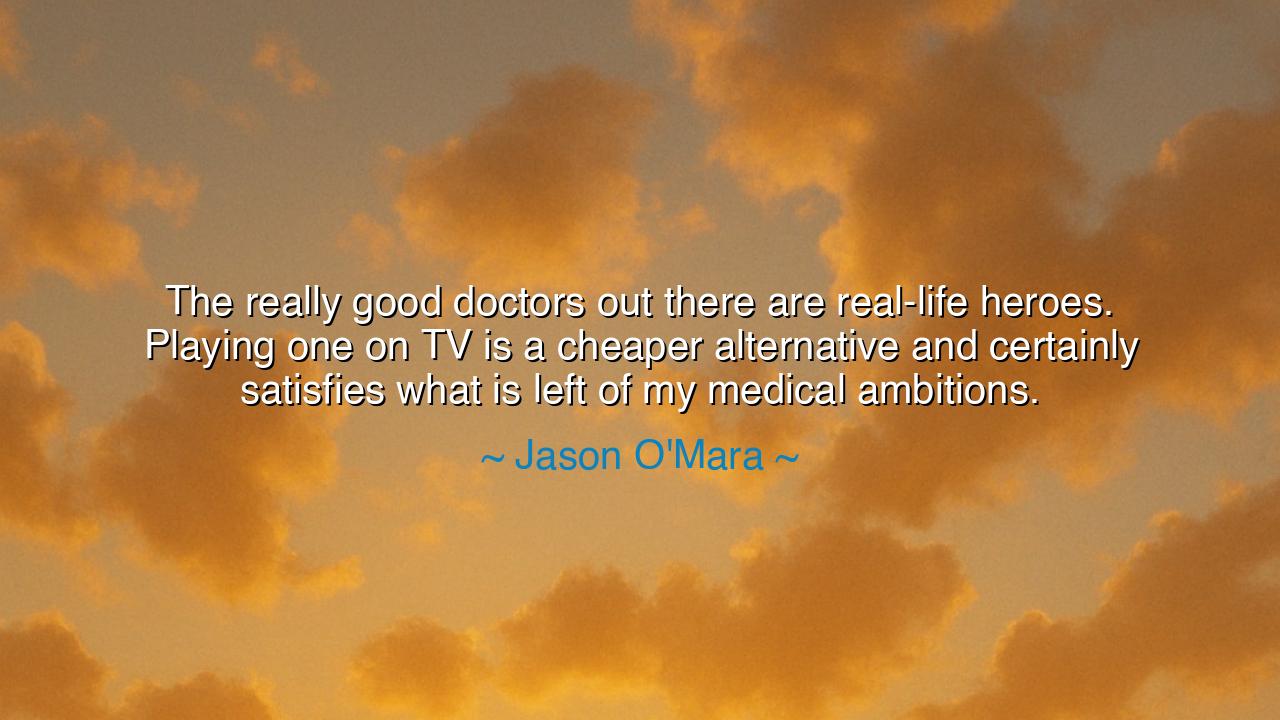
The really good doctors out there are real-life heroes. Playing
The really good doctors out there are real-life heroes. Playing one on TV is a cheaper alternative and certainly satisfies what is left of my medical ambitions.






In the words of Jason O'Mara, "The really good doctors out there are real-life heroes. Playing one on TV is a cheaper alternative and certainly satisfies what is left of my medical ambitions." This statement speaks to the reverence that those in the medical profession deserve, as well as the distance between fiction and the real sacrifices made by doctors. O'Mara acknowledges the heroic nature of doctors, recognizing that the work they do every day—healing the sick, comforting the dying, and navigating the complex world of medicine—truly elevates them to the status of heroes. Yet, in his role as an actor portraying such figures on screen, he humorously reflects on how the real-world challenges of medicine differ significantly from the dramatized version found in entertainment.
The ancients understood the concept of heroism as not merely about physical prowess but about selflessness and sacrifice. In Homer’s Iliad, the true heroes are not only the warriors who fight on the battlefield but those who endure suffering and make decisions that benefit the greater good. These heroic acts were not limited to acts of strength alone, but extended to those who used their wisdom and compassion for the good of others. The doctor, in this sense, is a modern hero, much like the ancient healers who dedicated their lives to caring for others, regardless of the cost to themselves. O'Mara's quote brings this ancient wisdom to the present, highlighting how doctors continue to perform their roles with the same sacrifice and selflessness that the ancients revered.
Consider the example of Hippocrates, the father of medicine, who is often seen as the embodiment of the heroic physician. Hippocrates understood that medicine was a sacred duty and required an unwavering commitment to the well-being of others. He wrote that the healer’s primary concern should be the care of the patient, regardless of the personal cost. Hippocrates’ legacy—embodied in the Hippocratic Oath—continues to guide doctors today, emphasizing that the role of the physician is not simply a job, but a calling that demands self-sacrifice and compassion. O'Mara's recognition of doctors as heroes aligns with this ancient ideal—doctors do not only heal bodies, they heal spirits, and often at great personal sacrifice.
In the modern world, the profession of medicine has become increasingly complex, yet the essence of being a doctor remains unchanged. The ancients understood that true heroism is about service to others, and in today’s world, this selflessness is embodied in the work of doctors who navigate the pressures of medical science, patient care, and the ethical complexities of modern healthcare. O'Mara, through his portrayal of doctors, emphasizes that these real-life heroes are often hidden behind the white coats, their work far more intricate and demanding than anything depicted on screen. The dramatic portrayal of medical professionals on television may satisfy a superficial yearning for heroism, but it is the real-life doctors who are the true practitioners of this sacred art.
Consider Florence Nightingale, a historical figure who became known as the Lady with the Lamp, tirelessly tending to wounded soldiers during the Crimean War. Nightingale’s work was not just about medical expertise; it was about sacrifice and a deep commitment to the well-being of others. Like Nightingale, modern doctors often work long hours under intense pressure, making difficult decisions in life-and-death situations. Theirs is a work of heroism, not because it is flashy or celebrated, but because it involves the quiet, unwavering care for human life. This is the type of heroism that O'Mara’s words acknowledge—the unsung, everyday effort that does not seek fame or glory, but serves the greater good.
The lesson we take from O'Mara’s quote is one of gratitude and recognition for the true heroes who work behind the scenes in the medical field. We must recognize that heroes are not always those who wear capes or receive public accolades, but those who devote their lives to the care and protection of others. Doctors, in this sense, are modern-day heroes, performing work that requires not only knowledge and expertise, but also a deep compassion for human suffering. Just as the ancients revered their healers for their sacrifice, we too must honor and respect the dedication of the medical professionals who care for us in our most vulnerable moments.
In our own lives, we can take this lesson and apply it by showing respect and gratitude for the medical professionals who contribute so much to our well-being. Just as the ancients valued the role of the healer, so too should we ensure that doctors and other healthcare workers are recognized for their service and sacrifice. Whether through a simple thank you, supporting policies that promote better healthcare, or being mindful of the challenges doctors face, we can all contribute to honoring the heroes who work tirelessly for the good of humanity. By doing so, we ensure that the tradition of sacrifice, service, and compassion—the true hallmark of a hero—is passed down to future generations.






AAdministratorAdministrator
Welcome, honored guests. Please leave a comment, we will respond soon